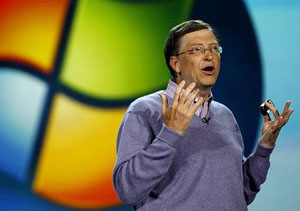
[HOME ] [ABOUT] [PHOTOS] [VIDEO] [BLOG] [HOUSTON] [TEXAS] [U.S. NEWS] [WORLD NEWS] [SPORTS] [POP CULTURE] [CONTACT]
Forbes list: The richest in America getting even richer

by Joseph Earnest September 16, 2013
Newscast Media NEW YORK—Forbes released its list of the 400 richest Americans, and it appears the wealthy have become wealthier. Bill Gates continues to hold the number one spot which has dominated for two decades is now worth $72 billion, while Warren Buffet comes in a distant second at $58.5 billion. Larry Ellison of Oracle, according for Forbes, has amassed wealth of $41 billion in third position.
The list also welcomed 20 newcomers, including e-commerce pioneer Fred Chang, the founder of Newegg. When e-commerce first started taking off in the early 2000s, dominated by Amazon and eBay, I remember Newegg, testing out the waters. The company has now grown to what it is right now, and owes a debt of gratitude to its founder Fred Chang. Below is a partial list of the top ten richest people in America.

List of the wealthiest Americans, courtesy Forbes magazine
There is also a very interesting dynamic I have observed about the list. I hate to say it, but if I don't, nobody will, out of fear of being politically incorrect. The question is, where the heck are all the Black moguls and business people? Not one single Black person is in the top 400 richest people, yet we always hear that Black Americans have a disposable income of $1.1 trillion dollars and are the 14th largest economy in the world. Black America would easily qualify to be part of the G-20 (the world's 20 strongest economies), if there was a spirit of collectivism rather than individualism in our community.
The Harvest Institute, which is a Black think tank founded by Dr. Claude Anderson explains why Blacks aren't accumulating as much wealth as their non-Black counterparts. The explanation is that almost every ethnic group builds communities and spends their money in their communities, yet Blacks are the largest consumers, but do not support or spend money in their own communities.
Anderson explains further that the ethnic groups in America have a captive audience from the communities they build—for example, Cubans have "Little Havana," Italians have "Little Italy", Mexicans have "Little Mexico", Germans have "German Town", Chinese have "Chinatown", Vietnamese have "Little Saigon", and so forth. That's why when a Chinese person leaves China to migrate to America, he or she doesn't have to worry about getting a job, or learning how to speak perfect English, because in any major city, he or she can find a job in a Chinatown. Likewise, an Italian flying in from Italy will find a job easily in Little Italy and other ethnic groups will find communities that can support them until they become legalized.
Africans on the other hand, once they land in America, are on their own, unless they come from wealthy families, since there is no Africatown in America.
Another reason, that I have personally observed, why Black wealth is not growing as it should, is because of the reluctance of most of the Black elites to mentor up-and-coming youths who are promising and gifted in certain areas. This leaves the younger generation to learn the ropes by themselves, without anyone looking over their shoulders.
However, I have to give credit to people like Arsenio Hall who in the 90s did every thing he could to give talented and gifted people a start on his show, and I was so glad that CBS offered him his own newlate night show after an absence of 19 years. One thing Arsenio has going for him is the vacuum that was created in the Black audience when Oprah left her show, and Arsenio's hip way of presenting his show to the audience. It is a mixture of old school and current affairs that will eventually propel him back to the top.
Donald Trump is another person I have deep respect for because he too uses his influence to support talent in the Black community. For example, there are musicians who had talent but could not get record labels to sign them, and Donald Trump took them under his wing and they flourished. There were people who may have been difficult to work with, but Trump mentored them and they got their own talks shows. Omarosa is one of those, who got her start through the mentorship of Trump. I should say Arsenio Hall owes a debt of gratitude to Donald Trump for reviving his career as a late night talk show host.
As from where I got my start doing what I now do, it was Houston's very own talk show host Deborah Duncan, who talked me into pursuing journalism. Deborah is perhaps the most well-mannered talk show host I have ever encountered.

(L-R) Deborah Duncan, Host of Great Day Houston on CBS channel 11 Houston, and Joseph's cropped-out right arm, in the studio in 2008. I cropped myself out to focus the attention on the woman who pointed me to my journalism career five years ago. I give credit where it is due. —Photo by Joseph Earnest
She has the most excellent manners in private and as a public figure, and it is obvious her parents did an incredible job raising her. Deborah literally took the morning off just to talk to me, inside the local CBS-TV affiliate studios here in Houston, and when she was done talking to me, I was convinced. A year later, I actually ended up getting an internship at the same network she worked for. I worked in the newsroom, and sometimes, I did cover events for her show Great Day Houston that airs every day at 9 a.m. on channel 11.
To see Forbes entire list of the top 400 billionaires click on this link. (pop-up)
|
|
Join the Newscast Media social networks
for current events and multimedia content.
Copyright© Newscast Media. All Rights Reserved. Terms and Privacy Policy
